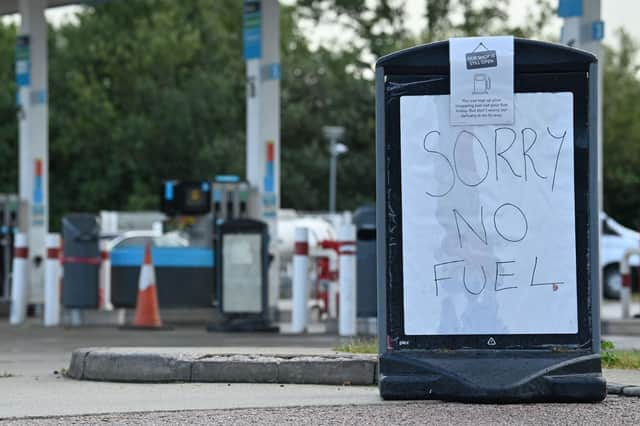When was the last fuel shortage in the UK and what happened?


The UK Government has continued to stress that there is no fuel shortage as Brits rush to petrol stations to fill up on fuel.
More than half of the UK’s petrol stations have now run out of fuel, according to reports, while as much as 90% are running low on petrol - despite many introducing £30 caps on fuel or closing to prevent drainage from panic buying.
Advertisement
Hide AdAdvertisement
Hide AdConcerns are now increasing over the availability of fuel for emergency vehicles across the country.
As the UK Government says it will be addressing the crisis with assistance from the UK armed forces, here’s when the UK experienced its last major fuel crisis – and what caused past shortages.
When was the last UK fuel crisis?
There have been several instances of petrol stations running dry and panic buying at the petrol pump in Britain due to a limited supply of fuel.
This took place most recently in 2012, as coalition government ministers urged UK citizens to fill up a full tank in anticipation of strikes by Unite the Union workers which were set to have an impact on fuel supply.
Advertisement
Hide AdAdvertisement
Hide AdComments from government officials such as then-Energy Secretary Ed Davey telling Brits “to do the sensible thing... get a full tank of petrol, not a half-tank" came under fire as people queued up at petrol stations across the country.
But the foremost recent fuel crisis came in autumn 2000, when Britain was brought to a standstill as HGV drivers and workers took to the streets to protest climbing fuel prices and the cost of crude oil soared to £23 a barrel and Tony Blair’s Labour Government refused to cut fuel duties.
Blockades took place in Scotland at sites like BP’s Grangemouth refinery, with farmers, lorry drivers and more attempting to hold up oil tankers attempting to leave the site.
How many petrol stations ran dry in September 2000?
As protestors blockaded UK oil refineries and terminals across the UK, Texaco reported that as many as a third of its then 957 petrol stations were running dry – with a third of its oil terminals also unable to deliver fuel to filling stations.
Advertisement
Hide AdAdvertisement
Hide AdBP was considerably affected by the protests and ensuing fuel shortage, with all of its petrol stations in Wales running dry and almost half of its stations across the UK were either empty or not far far off.
350 out of 1,100 Shell garages were reported to have run out of fuel or were running dry as of 12 September, with a Shell oil refinery in Warwickshire closed along with two of those servicing TotalFinaElf petrol stations – of which up to 40% were running low on petrol in September 2000.
The impact in Scotland saw the Scottish Ambulance Service make contingency plans such as a ban on non-emergency services, while Glasgow and Edinburgh Airport fuel supplies ran dangerously low as protest action continued at refineries and by road hauliers on busy roads across Scotland.
In total, up to 3,000 petrol stations in the UK were declared to be either empty or running dry by 12 September, with emergency service workers soon appealing to protestors on picket line as the Labour government staged emergency crisis talks.
Advertisement
Hide AdAdvertisement
Hide AdOil tankers eventually managed to break through crowds and blockades at Grangemouth, with other blockades at sites like Stanlow Refinery in North Wales later protests lifting to mark an end to protests and strikes.
A message from the Editor:
Thank you for reading this article. We're more reliant on your support than ever as the shift in consumer habits brought about by coronavirus impacts our advertisers.
If you haven't already, please consider supporting our trusted, fact-checked journalism by taking out a digital subscription.
Comment Guidelines
National World encourages reader discussion on our stories. User feedback, insights and back-and-forth exchanges add a rich layer of context to reporting. Please review our Community Guidelines before commenting.
